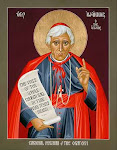What would high school be without English class? What would English class be without reading? What would reading be without annotating? Extremely boring without it because it’s so much fun!
Most Cardinal Newman students’ favorite assignment for English class is to read a piece of literature and “enhance our understanding and appreciation of the literature” by marking it up until its clean, white pages are pitch-black with annotations.
For those of you who do not know, annotating is English teacher jargon for a note-taking method used while reading that helps the reader identify the main points, remember them and reflect on them all while they read. Readers can summarize, predict, clarify, visualize by drawing pictures, react, connect, and question in the margins. Needless to say, it’s super great and we all love it.
Those of you reading this might be skeptical: “Why do they love annotating so much?” Well my dear reader, there are many reasons. Cardinal Newman students cannot pick up a book without annotating, it just doesn’t happen. They love to read closely, decipher the meaning of every word in every sentence, and spend extra time fully enjoying great literature by contemplating the entire novel as Sherlock Holmes would a mystery. Reading thirty pages would be so boring if it only took an hour. Newman students love annotating because it allows them to take this one hour of boring reading and doubling or tripling the time creating the most enjoyable reading experience. But most of all, Cardinal Newman students love to annotate because of the joy it brings to our teacher, Mr. Smith. We all love to see that shining smile after showing him our completed annotations. Nobody wants to be the student who brings Mr. Smith to tears because there was a blank page in their book.
Just to clarify, Mr. Smith is the advanced English teacher at Cardinal Newman. He is not Matt Damon, nor the World’s Sexiest Man Alive 2007; he just tries to look like it. And as far as we know, he is not a spy married to another spy who are both out to kill each other. This is all beside the point: Mr. Smith is truly the heart and soul of annotating. The way Mr. Smith acts about annotating makes it seem as if Newman students don’t want to annotate; if that were the case, that’s definitely news to me. Mr. Smith assigns it, teaches the correct way to properly annotate, and reminds us constantly to annotate. On the board for homework assignments reads, “Read and annotate novel.” Then again in class, “Don’t forget to annotate everybody!” And finally in the hall, Student: “How are you doing Mr. Smith?” Mr. Smith: “Annotate, annotate, annotate! Everybody annotate! You, and you, and especially you! Annotate!!!” The next day, after annotating for three hours the night before, students come to class and have their books checked off by Mr. Smith. After using his magnifying glass to check that we annotated to his standards, we are rewarded with five points and are quickly instructed to “pull out our annotaters” so we can write down the next day’s homework assignment, which is, you guessed it, annotating.
Overall, annotating can be a great tool to use while reading a book, and most Cardinal Newman students love annotating so much, they just couldn’t live without it. Not only do they love annotating, Newman students love the fact that they are forced to annotate even more. A wise student once said, “Annotating is like buying the cafeteria’s small, rip-off pizzas; it’s pointless but we do it anyway.”





No comments:
Post a Comment
Comments are encouraged. Each will be reviewed by Mr. Smith before posting. Any comments that are mean spirited or use inappropriate language toward the school or its students will not be posted. I especially welcome compliments, constructive criticism, questions, or general feedback on the essay.